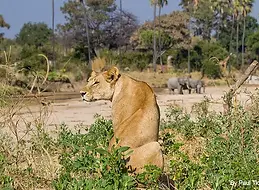Roaring Controversies
Balancing the Conversation - Conservation & Trophy hunting
Counter-intuitive as it may seem, trophy hunting – like photo tourism – provides a financial incentive to maintain wildlife habitat and populations. Sadly there simply aren’t alternatives ready at scale yet: photo-tourism is unlikely to be viable in most hunting areas, while new financial models for conservation are largely untested.
The following articles, open letters and documentaries give perspective and a balanced view to the debate around trophy hunting, the role it plays in conservation and the impact of bans. Focusing on trophy hunting distracts from key conservation threats.

By Amy Dickman & Alayne Cotterill
This document captures the contribution we provided to the Call for Evidence for the Animals Abroad Bill, based on our scientific knowledge and first-hand conservation expertise.

By Amy Dickman
MPs fail to recognise that, carried out properly, wild trophy hunting can provide vital revenue for conserving biodiverse habitats and many thousands of species. The current focus on trophy hunting is unbalanced and potentially counterproductive.

By Amy Dickman, Brian Child, Adam Hart and Catherine Semcer
Facts matter, and misinformation can have devastating real-world impacts. Trophy hunting is an emotive and polarising issue ripe for misinformation. Much of the discussion on both sides occurs in echo chambers, where falsehoods and half-truths are shared and perpetuated. Misinformation can eventually make its way into policy debates as it has in Congress, the California Legislature, and the UK Parliament.

Documentary, The Economist
Trophy hunting sparks outrage around the world. But the highly controversial sport can actually help to protect some of Africa's most endangered big animals.
Lion landscapes' joint CEO Amy Dickman was interviewed by The Economist in this short documentary on trophy hunting, highlighting that is a far more complex issue than it is portrayed.

Open letter
Many conservation scientists and experienced development practitioners are deeply concerned about the unintended consequences of a blanket ban and instead advocate for a “smart ban” in this open letter.
_JPG.webp)
By Cowboy Hat Films
In this short Documentary by Trent Houssenloge, he interviews conservationists Getrude Mwiba (Zambia), Henrick Munembome (Namibia), Amy Dickman (UK) and Geoge Temba (President of the Zambia Community Resources Board Association).

Open Letter
Over fifty community leaders, representing millions of people across southern Africa, urge UK-based celebrities to stop using their influence to undermine the human rights of impoverished people and jeopardise wildlife conservation in the region.

By Amy Dickman
In the Second Reading of the Bill, analysis being led by Oxford University scientists suggests that around three-quarters of verifiable statements made by supportive MPs were false.

By Amy Dickman & Alayne Cotterill
When did we all become so scared about sharing reality? Conservationists are often directly told not to raise important fears – such as the risk of habitat and biodiversity loss from misinformed policy – in case it alienates donors. This has very real consequences.

By Amy Dickman
If trophy hunting is banned without proper consideration, people will be disempowered, conservation will be harmed, and far more animals will die appalling deaths. Those deaths will be largely invisible–there will be no media fanfare or campaigning–but their impacts will be profound. More blood will soak the grass, this time of snared, speared and poisoned wildlife. And this time it will be on the hands of those who enabled it, or who were silent when they saw the risks.
.png)
